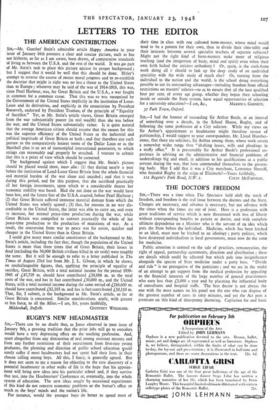RUGBY'S NEW HEADMASTER
Sta,—There can be no doubt that, as Janus observed in your issue of January 9th, a growing tradition that the prize jobs will go to outsiders would have a very depressing effect on the teaching profession. And, apart altogether from any diminution of zeal among assistant masters and from any further restriction of their recruitment from first-rate young graduates, the planning and direction of public school education Mould surely suffer if most headmasters had not spent half their lives in their chosen calling among boys. All this, I fancy, is generally agreed. But it does not seem to me a reason for objecting to the rare discovery of a potential headmaster in other walks of life in the hope that his appoint- ment will bring new ideas into his particular school and, if they survive that test, into the Headmasters' Conference or, eventually, into the whole system of education. The new ideas sought by occasional experiments of this kind do not concern economic problems or the bursar's office so much as the boys' minds and the nation's life.
For instance, would the younger boys• do better to spend most of
their time in class with one cultured form-master, whose mind would tend to be a pattern for their own, than to divide their time-table and their interests between several specialist teachers of separate subjects? Might not the right kind of form-masters make more of religious teaching (and the integration of body, mind and spirit) even when their own faith lacked the strictest orthodoxy ? Or, again, is the sixth-form work doing all it should to link up the deep study of an undivided speciality with the wide study of much else? Or, turning from the individual to the nation and the world, is the school doing everything possible to use its outstanding advantages—including freedom from official restrictions on masters' salaries—so as to ensure that all the best qualified four per cent. of every age group, whether they began their schooling inside or outside the State system, have equal opportunities of selection for a university education?—I am, &c., MAXWEI I. GARNETT. 37 Park Town, Oxford.






























 Previous page
Previous page